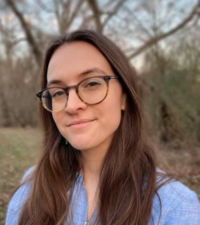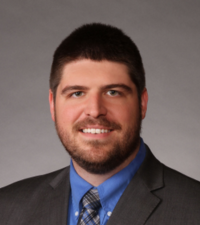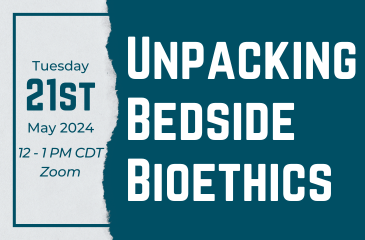

HEC-C
Surveys report that 60% of physicians reported that it was more ethically problematic and psychologically difficult to withdraw life-sustaining interventions than to withhold them (Chung et al). Is there a meaningful ethical difference between withdrawing and withholding treatment at the end of life? How should clinicians navigate disagreements surrounding life sustaining interventions at the end of life? This talk explores the ethical nuances of withdrawing or withholding life sustaining treatments. Through case studies exploring artificial nutrition and hydration, cardiac implantable devices, and mechanical ventilation, participants will gain an understanding of the ethics of withholding and withdrawal and their applications to clinical practice.
Learning Objectives: After attending this webinar, attendees will be able to:
- Understand the ethical similarities of withdrawing and withholding intervention.
- Explore the ethical differences between withdrawing life sustaining interventions and euthanasia.
- Analyze common cases for the ethical appropriateness of withdrawing or withholding care.
Bibliography
- Bosslet GT, Pope TM, Rubenfeld GD, et al. An Official ATS/AACN/ACCP/ESICM/SCCM Policy Statement: Responding to Requests for Potentially Inappropriate Treatments in Intensive Care Units. American Journal of Respiratory and Critical Care Medicine. 2015;191(11):1318-1330. doi:10.1164/rccm.201505-0924s.
- Brierley J, Linthicum J, Petros A. Should religious beliefs be allowed to stonewall a secular approach to withdrawing and withholding treatment in children? Journal of Medical Ethics. 2013;39(9):573-577. doi:10.1136/medethics-2011-100104.
- Brock DW. Life and Death : Philosophical Essays in Biomedical Ethics. Cambridge University Press; 1993.
- Chung GS, Yoon JD, Rasinski KA, Curlin FA. US Physicians' Opinions about Distinctions between Withdrawing and Withholding Life-Sustaining Treatment. J Relig Health. 2016 Oct;55(5):1596-606. doi: 10.1007/s10943-015-0171-x. PMID: 26725047.
- Emmerich N, Gordijn B. Beyond the Equivalence Thesis: how to think about the ethics of withdrawing and withholding life-saving medical treatment. Theoretical Medicine and Bioethics. 2019;40(1):21-41. doi:10.1007/s11017-019-09478-9.
- Harter TD, Sterenson EL, Borgert A, Rasmussen C. Perceptions of Medical Providers on Morality and Decision-Making Capacity in Withholding and Withdrawing Life-Sustaining Treatment and Suicide. AJOB Empirical Bioethics. 2021;12(4):227-238. doi:10.1080/23294515.2021.1887961.
- Kon AA, Shepard EK, Sederstrom NO, et al. Defining Futile and Potentially Inappropriate Interventions: A Policy Statement From the Society of Critical Care Medicine Ethics Committee. Critical Care Medicine. 2016;44(9):1769-1774.
- Mohiuddin A, Suleman M, Rasheed S, Padela AI. When can Muslims withdraw or withhold life support? A narrative review of Islamic juridical rulings. Glob Bioeth. 2020 Mar 22;31(1):29-46. doi: 10.1080/11287462.2020.1736243. PMID: 32284707; PMCID: PMC7144300.
- President’s commission
- Reichlin M. On the ethics of withholding and withdrawing medical treatment. Multidisciplinary Respiratory Medicine. 2014;9(1):39-39. doi:10.1186/2049-6958-9-39.
- Sulmasy DP, Sugarman J. Are withholding and withdrawing therapy always morally equivalent? Journal of Medical Ethics. 1994;20(4):218-222. doi:10.1136/jme.20.4.218.
- Zhong Y, Cavolo A, Labarque V, Gastmans C. Physicians’ attitudes and experiences about withholding/withdrawing life-sustaining treatments in pediatrics: a systematic review of quantitative evidence. BMC Palliative Care. 2023;22(1):1-145. doi:10.1186/s12904-023-01260-y.
Speaker(s)
Dr. Jaime Konerman-Sease is a Clinical Ethics Assistant Professor at the University of Minnesota Center for Bioethics. She is a member of the team at the Center for Bioethics that provides clinical ethics services for the MHealth Fairview System. Her role includes clinical ethics consultation, policy development, and education for all hospitals in the MHealth Fairview system. Additionally, she is a member of the UMMC Ethics Committee.
Dr. Konerman-Sease's academic work focuses on Disability Bioethics, Medicine and Literature, and Religious Bioethics. By drawing from historical sources, she highlights novel solutions to modern-day health care problems. Her current project draws on the novels of Jane Austen to provide solutions to the marginalization of patients with chronic and incurable illnesses in Medicine. Her future work will continue to focus on the intersection of Medicine, Literature, Theology and Disability.
Dr. Konerman-Sease completed her PhD in Health Care Ethics and Theology at Saint Louis University in 2022. Konerman-Sease was a 2020-2021 Student Intern for Ethics and Theology at CommonSpirit Health where she assisted in clinical ethics consultation, policy development, and scarce resource allocation. She received the 2023 Emerging Scholar Award from the Institute on Theology and Disability for her doctoral work on chronic illness, Jane Austen, and Christian theology.
Dr. Justin Penny, Assistant Professor, Department of Family Medicine and Community Health, UMN and faculty at the University of Minnesota Medical Center Family Medicine Residency Program (Smiley's). He practices full spectrum family medicine, including hospital medicine, obstetrics, primary care, and LGBTQ+ comprehensive care. Through his joint appointment in the University of Minnesota Center for Bioethics, he is part of the Clinical Ethics Consult team providing clinical ethics services for the MHealth Fairview system and serves on the UMMC Ethics Committee.
Dr. Penny's current academic and research focus is the intersection of LGBTQ+ care and Bioethics, care delivery and medical education concerning transgender and gender nonconforming care, and the needs of an aging LGBTQ+ population.
Dr. Penny has a BS in Biology and a BA in Classics from the University of Kentucky. He completed his DO and MA in Bioethics from Kansas City University. He completed his residency in Family Medicine at the University of Minnesota. He is board certified in Family Medicine from the American Board of Family Medicine as well as Family Medicine and Osteopathic Manipulative Treatment from the American Osteopathic Board of Family Physicians. He has earned the Healthcare Ethics Consultant Certification (HEC-C) credential through the American Society for Bioethics and Humanities (ASBH).
